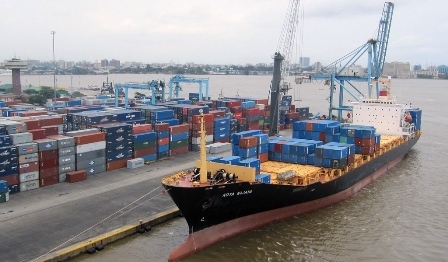Nigeria’s foreign trade data for June 2023 reveals a total trade value of N12.74 trillion, with significant findings from the 2024-2026 Medium Term Expenditure Framework (MTEF), and Fiscal Strategy Paper (FSP), exclusively disclosed by Tribune Online.
Export destinations for Nigeria in 2022 saw the Netherlands, the United States of America, and Indonesia emerging as top markets. Total exports from Nigeria amounted to N7.02 trillion, while imports reached N5.73 trillion.
Specifically, the Netherlands led the list of export destinations with N788.85 billion (11.24% of total exports), followed by the United States of America with N718.63 billion, Indonesia with N550.18 billion, France with N540.73 billion, and Spain with N504.45 billion. These top five countries accounted for 44.23% of total export value.
Total imports in Q2 2023 showed a 2.99% increase from the first quarter of 2023, but a 10.37% decline from the same period in 2022. China, the United States, Belgium, India, and the Netherlands were the leading countries of origin for imports. China, in particular, was the largest source of imports, contributing N1.27 trillion, representing 22.17% of the total.
The top five countries supplying imports collectively represented 60.05% of the total import value. Notably, Premium Motor Spirit imports accounted for 21.5% of imports, equivalent to N1.23 trillion, while other imports included used vehicles and Automotive Gas Oil (AGO).
Total exports in Q2 2023 increased by 8.15% compared to the first quarter of 2023 but declined by 5.20% compared to the same period in 2022. The most significant export product was ‘Petroleum oils and oils obtained from bituminous minerals, crude,’ valued at N5.59 trillion, constituting 79.63% of exports. Other export products included Liquefied Natural Gas (LNG) and Urea.
Foreign Portfolio Investment (FPI) represented the most substantial capital importation type, amounting to US$3.30 billion, although this figure was 34.1% lower than the US$5.14 billion recorded in 2020. Foreign Direct Investment in Nigeria amounted to US$696.78 million, marking a 32% decrease from the preceding year.
The document highlights a concerning trend of declining capital importation in Nigeria, with a consistent decrease from an annual level of $16.812 billion in 2018 to a mere $5.32 billion in 2022.
“Quarterly data also showed capital importation declined by 51.51% from $2.187 billion recorded in Q4 2021 to $1.06 billion in Q4 2022.
“Trade deficits, loans, currency deposits represent the largest component of capital importation in 2022 accounting for 65.17% ($691.23 million) of total capital importation in Q4 2022.
“This was followed by Portfolio Investment with 26.89% ($285.26 million) and Foreign Direct Investment (FDI) with 7.94% ($84.23 million).”



